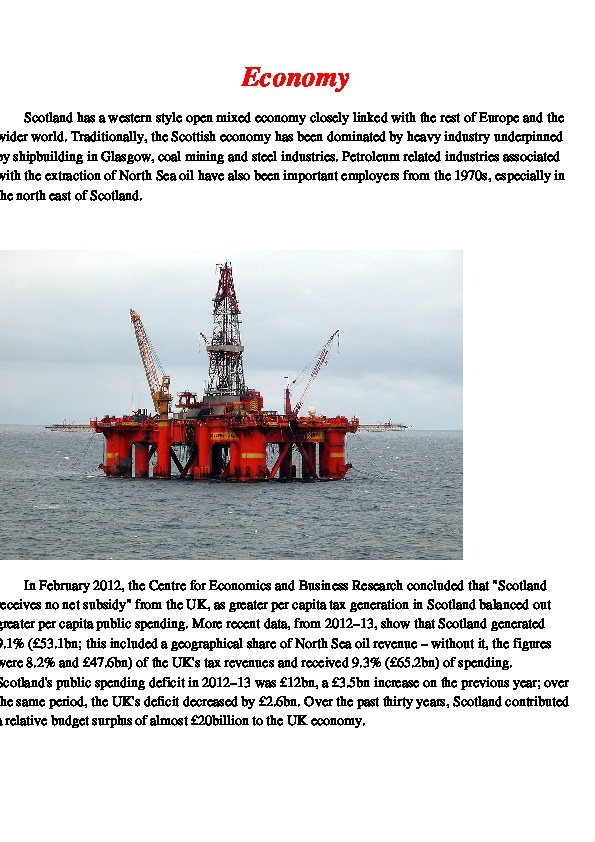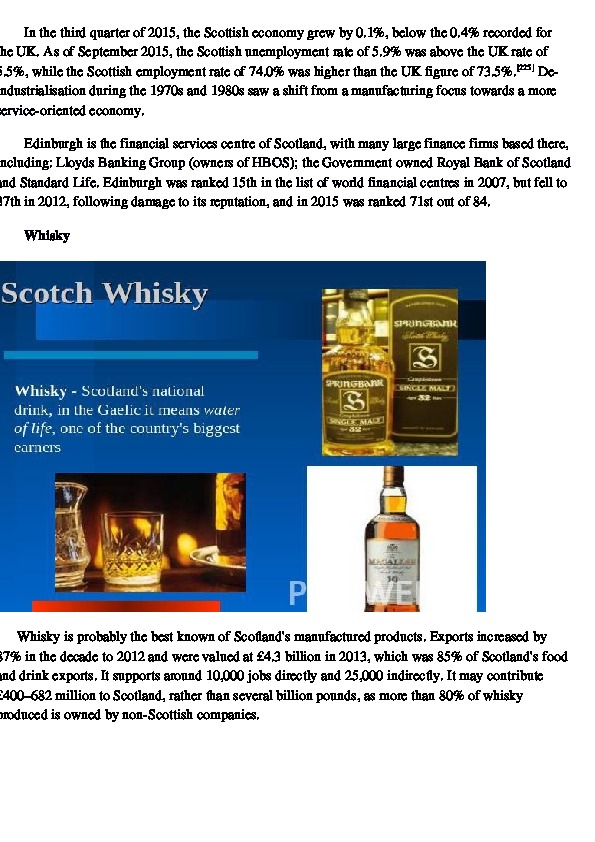Краткое описание документа:
Scotland has a western style open mixed economy closely linked with the rest of Europe and the wider world. Traditionally, the Scottish economy has been dominated by heavy industry underpinned by shipbuilding in Glasgow, coal mining and steel industries. Petroleum related industries associated with the extraction of North Sea oil have also been important employers from the 1970s, especially in the north east of Scotland.
Economy
Scotland has a western style open mixed economy closely linked with the rest of Europe and the
wider world. Traditionally, the Scottish economy has been dominated by heavy industry underpinned
by shipbuilding in Glasgow, coal mining and steel industries. Petroleum related industries associated
with the extraction of North Sea oil have also been important employers from the 1970s, especially in
the north east of Scotland.
In February 2012, the Centre for Economics and Business Research concluded that "Scotland
receives no net subsidy" from the UK, as greater per capita tax generation in Scotland balanced out
greater per capita public spending. More recent data, from 2012–13, show that Scotland generated
9.1% (£53.1bn; this included a geographical share of North Sea oil revenue – without it, the figures
were 8.2% and £47.6bn) of the UK's tax revenues and received 9.3% (£65.2bn) of spending.
Scotland's public spending deficit in 2012–13 was £12bn, a £3.5bn increase on the previous year; over
the same period, the UK's deficit decreased by £2.6bn. Over the past thirty years, Scotland contributed
a relative budget surplus of almost £20billion to the UK economy.In the third quarter of 2015, the Scottish economy grew by 0.1%, below the 0.4% recorded for
the UK. As of September 2015, the Scottish unemployment rate of 5.9% was above the UK rate of
5.5%, while the Scottish employment rate of 74.0% was higher than the UK figure of 73.5%.[225] De
industrialisation during the 1970s and 1980s saw a shift from a manufacturing focus towards a more
serviceoriented economy.
Edinburgh is the financial services centre of Scotland, with many large finance firms based there,
including: Lloyds Banking Group (owners of HBOS); the Government owned Royal Bank of Scotland
and Standard Life. Edinburgh was ranked 15th in the list of world financial centres in 2007, but fell to
37th in 2012, following damage to its reputation, and in 2015 was ranked 71st out of 84.
Whisky
Whisky is probably the best known of Scotland's manufactured products. Exports increased by
87% in the decade to 2012 and were valued at £4.3 billion in 2013, which was 85% of Scotland's food
and drink exports. It supports around 10,000 jobs directly and 25,000 indirectly. It may contribute
£400–682 million to Scotland, rather than several billion pounds, as more than 80% of whisky
produced is owned by nonScottish companies.


